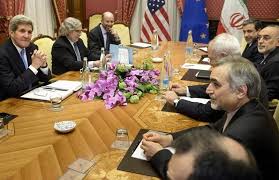 Landmark talks to try and break years of dispute over Iran’s ambitious nuclear programme approached a critical point on Sunday as world leaders converged on the Swiss lakeside city of Lausanne.
Landmark talks to try and break years of dispute over Iran’s ambitious nuclear programme approached a critical point on Sunday as world leaders converged on the Swiss lakeside city of Lausanne.
Wang Yi of China joined Laurent Fabius of France, Frank-Walter Steinmeier of Germany, Federica Mogherini of the EU and John Kerry of the US in the push to reach a final agreement with Tehran.
Philip Hammond of the UK and Sergei Lavrov of Russia joined late in the day. Their presence is being read as a bellwether of the proximity of an agreement.
Discussions have reached the “endgame”, Mr Steinmeier told reporters earlier in the weekend.
Despite significant momentum, with agreement reached in principle on many of the key points of a deal, diplomats say they are cautious on the likely outcome. They have repeatedly stressed that no deal will be announced unless it covers all subjects to the satisfaction of all parties.
There remains no certainty over whether that will be possible, one senior European official told the Financial Times, stressing that nothing was solved until everything was.
An indication of the complexity of the negotiations is that the deal being worked towards is merely an interim political agreement, albeit a comprehensive one, aimed at signalling significant progress to sceptical hawks in the US Congress and hardliners in Tehran. If an agreed position is reached in the next few days, the final agreement will be inked at the end of June, assuming the three months of technical fine-tuning goes to plan.
What form the political agreement will take is unclear: some negotiators in Lausanne have referred to a brief written “fact sheet”. Others believe it could be a simple joint statement.
One UK official noted that if too much is written down it would give critics material to pull apart, but if too little was divulged, it would ring hollow.
The phasing of trade embargo relief for Iran, and specifically the demand for rapid lifting of UN sanctions emerged as a key sticking point to any deal, with neither side showing signs of backing down.
Keeping the UN sanctions regime in place has been a red line for world powers, represented by the P5+1, the five permanent members of the security council plus Germany. They regard it as the cornerstone of their isolationist policy towards Iran, and vital to being able to ratchet up pressure should Tehran renege on a deal.
Mr Steinmeier told reporters late on Sunday that while an agreement was possible it would only be achievable if Iran showed significantly more “flexibility” on the question of sanctions relief.
Other unresolved issues include research into new, more advanced centrifuges for enrichment and what nuclear activities Iran may be allowed after the initial 10 years of any settlement.
The pressure to reach an agreement is high. As security conditions worsen in the Middle East, the Iran nuclear talks offer a rare opportunity for diplomacy to resolve one of the region’s most intractable disputes.
For years, the Islamic Republic has insisted it has the right to peaceably enrich its own uranium. World powers say the nuclear programme is designed to build atomic weapons. After repeatedly failing to comply with inspection requests by the International Atomic Energy Agency, however, Iran’s position grew steadily more untenable. In 2012, the international community imposed sweeping new sanctions against Tehran that have brought the country’s economy to its knees.
A deal with Tehran is one of the main foreign policy objectives for US President Barack Obama. But the prospect of nuclear detente with the Islamic regime has also invited fierce criticism, alienating regional allies of the west in Israel and the Gulf region.
Benjamin Netanyahu, Israel’s prime minister, told his cabinet on Sunday that the agreement, “as it appears, confirms all of our concerns and even more so”.
With a deal so close, both sides of the negotiating table are now calling for the other to make concessions in a final push.
“In negotiations, both sides must show flexibility. We have, and are ready to make a good deal for all. We await our counterparts’ readiness,” tweeted Mohammad Javad Zarif, Iran’s foreign minister.
Financial Times

Leave a Reply
You must be logged in to post a comment.